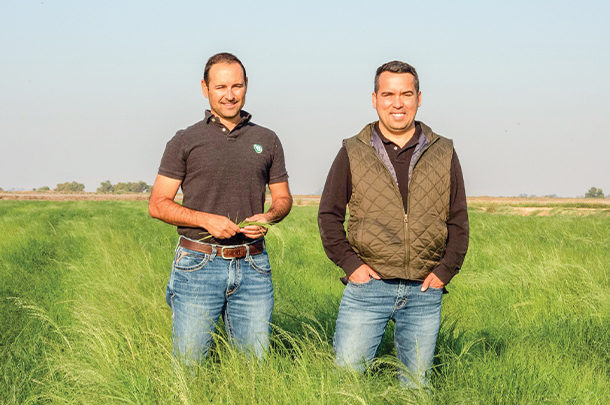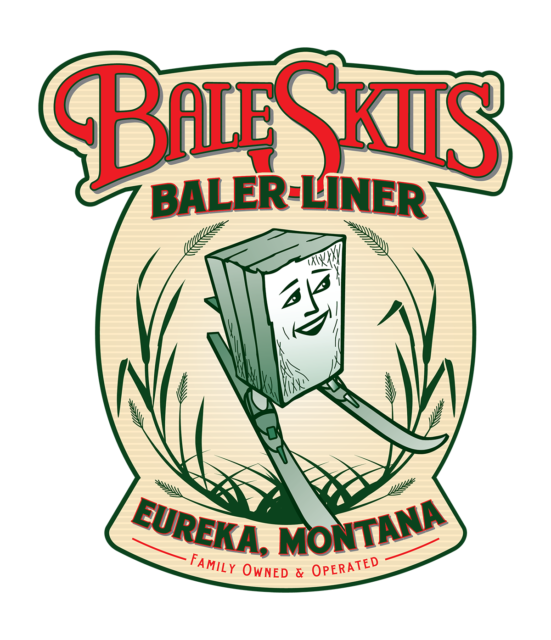Bowles Farming Co., located in Los Banos, California, was founded in 1965 by siblings George and Henry Bowles, and Amy Bowles Lawrence. The farm was created with the remaining acres of Miller and Lux Inc., a farm owned by their grandfather Henry Miller.
“At the time of Henry Miller’s death, there was not another family member in a position to effectively lead the company forward; consequently, land was sold and eventually Miller and Lux dissolved,” says Derek Azevedo, vice president of Bowles Farming Co.
Although the farm changed from Miller and Lux Inc. to Bowles Farming Co., six generations of family members have been actively involved in the family business.
“Now, we farm about 11,000 acres,” Azevedo says. “Six hundred and forty of that is managed wildlife wetlands. The rest is primarily row crops such as cotton, tomatoes, melons, herbs and root vegetables.”
Additionally, Ben Garcia, farm manager, says he expects to harvest 15 additional crops in 2020. This diversity is possible because of partnerships with other companies.
“We are more confident in growing [diverse crops] now because of our relationships with those companies,” Garcia says. “We seek out companies that provide strong agronomic support and who are willing to help teach us some of the subtle tricks to growing a new crop.”
Azevedo says the farm is a combination of both conventional and organic farming. “I try to mirror the macro-consumption of organic,” he says. “So if organic makes up 6 percent of the American diet, we try to keep our farm about 6 percent organic.”
Although the majority of the land is used for crop production, managing natural wildlife habitat is an important component of Bowles Farming Co. “We are producing California native plant species to help other people restore habitat on some of their farmland, roadways or areas damaged by forest fires,” Azevedo says.
Reyn Akiona, environmental program director at Bowles Farming Co., and his team are promoting wildlife conservation through stewardship projects. These projects include a pollination partnership, a native seed program and riparian landscape restoration.
“The state of California has a pretty significant deficiency in native materials to implement habitat projects,” said Akiona. “We decided to recruit some of Bowles’ operation to improve the development of native plant materials.”
Akiona and his team completed the Pick Anderson Bypass Habitat Project, which restored about 4 miles of riparian habitat.
One of his favorite projects was the native seed project. He collected, identified and cleaned new seeds from the San Joaquin Valley and then transferred them into agricultural fields. These will provide a new generation of native plant material.
“Integrating technology and being able to track how much water is being placed on any field, how frequently [fields] are being irrigated, real-time soil moisture monitoring … that clarity of data management is maybe the most impactful [sustainability] practice,” Akiona says.
The employees of Bowles Farming Co. use sustainable and environmentally friendly practices in their crop production, as well. These practices include various irrigation systems, solar energy and modified tillage systems that promote soil health. “We research a wide variety of agricultural technology from drones and soil moisture sensors to robotic weeding robots,” Azevedo says.
The ranch has many moving pieces because of the diversity of crops grown, Garcia says. The diverse crop mix requires nimble, diverse irrigation systems. Most commonly, the farm utilizes sprinkler, drip, temporary drip tape and traditional flood irrigation practices. By matching irrigation practices to crop needs, water efficiency is maximized.
To cope with increased demands of energy from the irrigation systems, the owners of Bowles Farming Co. installed two solar energy fields.
“We are working on a carbon farming plan,” Akiona says. “It takes a lot of collaboration with nonprofit groups and agencies.” Their carbon farming project began almost two years ago.
“The goal is to quantify different practices we are taking on the ranch and figure out what we can do … that would result in storing more carbon from the atmosphere into the soil,” Akiona says.
Additionally, the farm included a permitted compost site to receive green waste that is no longer allowed to be dumped at landfills. Azevedo remarked, “It’s not glamorous, but our soil loves compost.”
The crops and land are well cared for at Bowles Farming Co., and so are the people, Akiona says.
“When we tried to synthesize what our culture means to us and who we are, we came up with two words,” Azevedo says. “They are respect and grow.”
The staff try to embody these two values at Bowles Farming Co. Caring for workers is a priority. Many of the management positions at the farm were filled by employees who spent years working on the farm. “We invest a lot in our people,” Azevedo says.
Children of employees are eligible for a scholarship through the company and receive schools supplies every fall. “If you work hard and do all the right things, there are opportunities here,” Garcia says.
The culture of respect is vibrant on the farm. Employees respect one another and share a feeling of equality.
“Not only do we grow crops, but we grow people,” Garcia says. The most rewarding part of the job is watching the men he works with grow and develop in their careers.
Another cultural value of Bowles Farming Co. is optimism. Garcia recognizes farming is not easy and reminds his staff to remain optimistic during tough times.
Growing food in California comes with challenges, but Azevedo says he is confident the people at Bowles Farming Co. are creative enough to overcome these obstacles.
“At the end of the day, agriculture still is a wonderful activity,” Azevedo says. “It is an incredibly fulfilling profession, and it is incredibly rewarding to be so close to the creation of food and the creation of things that genuinely nourish other people.”











